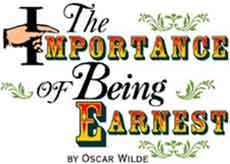“Picture this: two Victorian-era English gentlemen are sharing tea in a courtyard. Both speak very aristocratically, punctuating their sentences with “good heavens” and “I wish to goodness.” But they are speaking utter nonsense.
“How you can sit there, calmly eating muffins when we are in this horrible trouble, I can’t make out,” Jack, the more proper gentleman, in an accent that belongs either in a vault or on a stage, asks of his counterpart. “You seem to me to be perfectly heartless.”
“Well, I can’t eat muffins in an agitated manner,” his rakish friend Algernon responds. “The butter would probably get on my cuffs. One should always eat muffins quite calmly. It is the only way to eat them.”
The college’s Theatre Studies department turns this exchange into a sublimely funny moment – one of many in their creative presentation of The Importance of Being Earnest, which opened April 15 and runs through April 23.
Director Michael Kamtman, visiting drama professor, has re-imagined Oscar Wilde’s classic comedy for the twenty-first century. Kamtman weds Wilde’s witty social critique of Victorian society to post-modern sensibilities, creating a new, absorbing interpretation.
“While there is a specific style the play is written in, and a specific world it is taking place in, we do have a unique concept and approach to it,” Kamtman said.
The Theater Studies Department is going to great lengths not to reveal “the concept” that makes the show so much fun to watch. Kamtman made me swear not to publish the secret, and before each performance, House Manager Danielle Cormier reads an announcement asking the audience not to reveal “any parts of the performance” to people who have not been to the show yet.
“This (production) is ours,” Kamtman said. “That’s what’s so exciting: it’s unique.”
Without giving too much away, the production focuses on the duality of both human nature and theater. Like the characters in Earnest, Kamtman presents two realities – the one we show to the world, and the one we’d prefer to keep to ourselves.
Sean Martin’s set design captures this duality – his creative design allows the audience to choose between seeing the show from two different angles. The show’s music, which features a hilarious vaudeville version of Avril Lavigne’s “Complicated,” also helps reinforce the theme.
Kamtman avoids turning the production into a two-and-a-half-hour gimmick, thanks in part to the cast. The actors imbue their characters with a healthy dose of humanity, and their work helps make Earnest a compelling show.
Junior Jake Kalos plays Algernon with charm and a mischievous mustache. The ne’er-do-well falls in love with his friend Jack’s adopted daughter Cecily, played by junior Samantha Kittle, with a balance of sophistication, sweetness and guile that turns her scenes with Kalos into high comedy.
Kittle and Kalos’ romance is mirrored by Jack’s courtship of Gwendolen, Algernon’s cousin. Junior Drew Dupont plays Jack with a gravity that lends itself to Wilde’s deadpan script. As Gwendolen, junior Vita Generalova, walks and talks with aristocratic flair.
First-year Madeleine Pope is excellent as Miss Prism, Cecily’s prim tutor. Her best moments come opposite her nervous suitor Chasuble, played by freshman Sean Finan with a frenetic jauntiness.
Algernon’s mother, Lady Bracknell (first-year Maryam Benganga), with ferocity, runs the household with an iron-fist.
First-years Derek Loehr and Mike O’Malley compliment the cast as the manservant and butler who wordlessly observe the farcical goings-on.
Earnest is peppered with the three couples’ flirtatious bantering, confusion over bloodlines, a missing carrying bag, and “bunburrying”-a word Algernon invents to describe social trickery. The silly, convoluted plot of Earnest is of secondary importance, but don’t be surprised to find yourself actually caring about the character’s problems.
“Even with the ridiculousness of the characters, there’s an emphasis on real emotion,” said Kalos.
Even at their most ridiculous, the actors never lose sight of their characters’ motivations. “All the funny moments come from the characters trying to get what they want,” said Kittle.
Some of the best gags are not written into the script, and according to Kalos, most were not added until the last few rehearsals. Some, such as Algernon stuffing a cucumber sandwich into his breast-pocket, came about accidentally.
“I put the sandwich in my pocket because there were simply too many on the plate to eat,” Kalos said. “I take it out and eat it later, because it’s something Algernon would actually do.”
Moments like these are manna to Kamtman. “I like to stay open because I really thrive on other people’s ideas,” he said. “I try to get a lot of give-and-take.”
“I think it’s very natural,” Kittle said of Kamtman’s directing style.
If the cast were less dedicated to their characters, this laid-back approach might have failed. But, the actors are obviously comfortable portraying characters that lived one hundred years ago.
According to Kittle, Kamtman helped the actors discover their roles by hosting a Victorian tea-party the cast attended in-character. Kamtman also conducted character interviews, in which the actors’ character would be questioned, and hosted dialect rehearsals.
“The fact that we have been able to rehearse since January allows us to accomplish things we couldn’t do in a six-week period,” Kamtman said.
“What’s really exciting is seeing it evolve,” he continued. “It starts in your head, then it begins to take shape- usually in a more imaginative way that you had pictured it.

